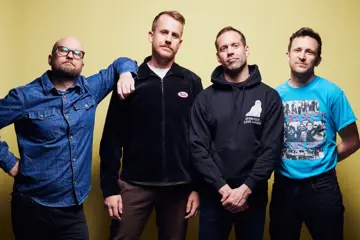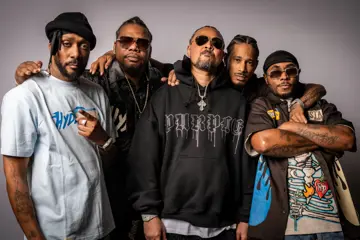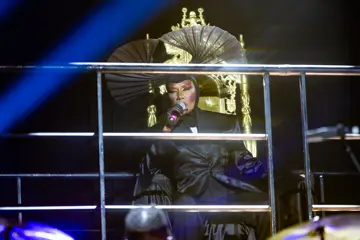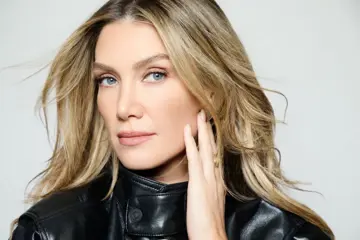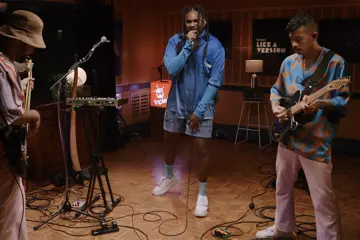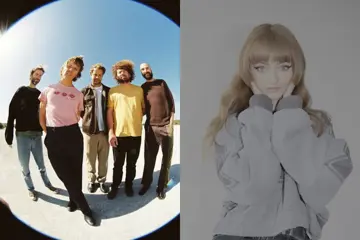 Max Jury
Max JuryThe recording of singer-songwriter Max Jury's self-titled debut album was almost scuppered when a week into sessions at New York's prestigious Electric Lady Studios a late-night accident, which saw candle wax spilling onto the famous console, found him ejected from the facility.
The session had been productive to that point, especially his burgeoning partnership with hip hop producer Inflo (whose influence Jury says was "pivotal in determining how the album would sound"). Now short on budget, Jury — who grew up in Des Moines, Iowa but these days resides in London — decided to continue recording at his friend's house in rural North Carolina, where he soon encountered another (less likely) figure who would also play a big role in the album's genesis.
"We'd started incorporating these sorta gospel elements to the tunes in New York and, when I went to my friend Stacy [TK]'s house in North Carolina, I didn't want to give that up," Jury recalls. "I was concerned because the people I'd worked with in New York were just super-talented and had this energy and this sound that I hadn't been able to find in a place like Des Moines, or even London — there was a certain character to their voices, they just had a phenomenal groove and an understanding of music and putting soul into it — so then I was quite concerned that we wouldn't be able to capture this with the sounds we were doing at home.
"I just find it really interesting that you have this guy who lives in the middle of nowhere and has some YouTube videos up with, like, 250 or 300 views and he's maybe the best musician I've ever played with or encountered in my life."
"Then we stumbled upon this guy Jackson Russell's YouTube account: he was a choir director-slash-church leader-type dude based about 40 miles from where we were recording. His YouTube account had clips of him playing guitar and singing his own songs as well as old gospel standards and stuff, so we reached out to him to see if he wanted to be involved in the project. He seemed to like the music, or respond to it, and he agreed to help out.
Don't miss a beat with our FREE daily newsletter
"He's just this super-great multi-instrumentalist and he and his cousins sang on the record, and they really helped bridge the gap with what we were doing in New York and what we were trying to accomplish in North Carolina. He was a lovely guy, too, and I just find it really interesting that you have this guy who lives in the middle of nowhere and has some YouTube videos up with, like, 250 or 300 views and he's maybe the best musician I've ever played with or encountered in my life — he's just so talented — and it just makes you wonder why he's hiding where he's hiding."
Jury's music is often described as "country-soul", a tag that makes complete sense to the man himself. "When I sit down and write songs I just kinda think of them as pop songs," he reflects. "But I grew up listening to old-school country — and to this day I listen to a lot of it — and I listen to a lot of old soul. So those are two musical genres that I'm naturally inclined to listen to and love, so I think that seeps into the music I make. It's unavoidable.
"I had some EPs out before the record that were a lot more country-sounding: on the album I shifted a little more to the pop-song world, not in a good way or a bad way, I don't think; it's just that the project got a little less country as time went on for some reason. But country totally comes through in my music, because whether it's Townes Van Zandt or Willie Nelson it's just the stuff that I worship and grew up on."
After traversing the Atlantic to pursue his career, Jury believes that where you're based inevitably seeps into your music. "Growing up in Des Moines and writing from that perspective — and I don't want to sound cliche or silly — but you're driving down the highway a lot and you're surrounded by a certain type of people, and you're playing the country radio station," he offers, "so just the imagery that's around you is inclined to come out as more of a country song.
"But in London it's just so different. Country music is so not a part of London — unless you go out of your way to hear it you'd just never be exposed to it, and you can almost just forget about it, in a way. So I think location definitely plays into what my music sounds like, just because you have different experiences and different music is playing all the time."




